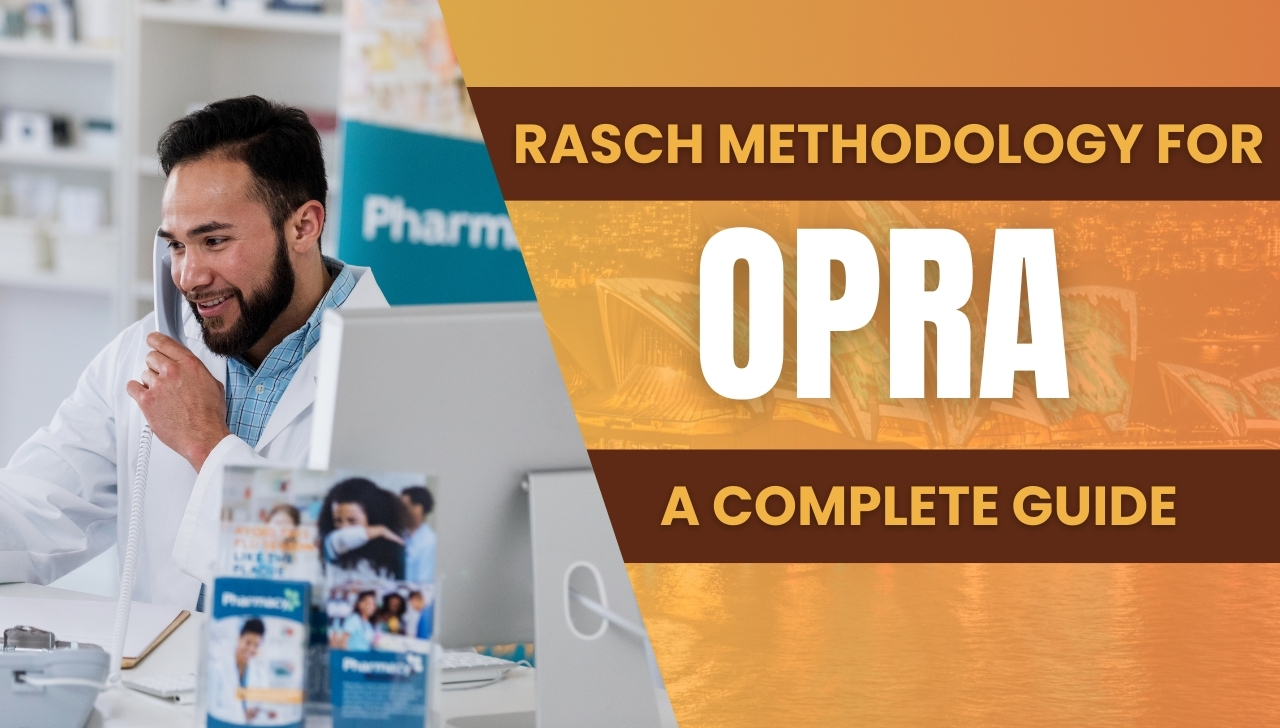What is Rasch Methodology?
Rasch methodology is a powerful statistical model used in global educational assessments to test the competence of individuals. It works by examining the difficulty of the exam questions and the ability of the candidates, and making a comparison to determine the final score. It is named after Danish mathematician Georg Rasch, and is widely adopted in several global examinations, including the ones conducted by the Australian Pharmacy Council.
The Rasch methodology for the OPRA exam is to ensure that you are judged not only on the basis of the number of answers you got right, but also how hard they were. Unlike traditional scoring models, where there is a fixed passing score and negative marking or not, the Rasch model is dynamic. It considers-
- Item parameters – how difficult each question is.
- Person parameters – how knowledgeable the candidate is.
The result? An adaptive assessment which is fairer and reveals candidates’ true ability and not just theoretical knowledge or test skills.
How Does it Work?
Imagine the OPRA examination like a video game. Each level, or question, in this scenario has a difficulty score. While some levels are easy for almost everyone to clear, the others are tough, and only the skilled players get through them.
The Rasch model tracks how well you perform across different levels on the basis of these strategies-
- Correctly answering difficult questions will boost your score more than getting easy ones right
- Missing easy questions might suggest that you do not have foundational knowledge, which lowers your score
Let us now see how the OPRA exam uses this model-
- A large pool of questions is created with the goal of testing core pharmacy competencies.
- These questions are then tested on diverse pharmacy candidates to check their performance and variations.
- Using statistical tools, the difficulty level of each question is measured.
- Questions that seem to be too confusing or biased, or don't behave as expected are removed or revised.
- Only well-balanced questions, ranging from easy to hard, are included in the real exam.
The final score of the candidate depends on how many questions they got right, but also how hard they were. It ensures that no candidate is penalised for getting a hard set of questions.
With this strategy, the testing model creates a level playing field. So whether your paper had tougher questions or easier ones, your scoring will be adjusted fairly.

What is OPRA? Why Does it Use Rasch?
The Australian Pharmacy Council conducts the OPRA exam to evaluate whether you, as an internationally qualified pharmacist, are competent to practice safely in Australia. This single exam can be a gateway for you to practise pharmacy and build a well-being career in this amazing country. Therefore, this exam needs to be accurate, fair and future-focused.
That is why rasch methodology is used. Here are a few benefits of using Rasch in OPRA-
- Fair evaluation- The candidates are tested on the basis of their actual ability, and thus luck by chance does not work here.
- Bias-free testing- Before including them into the examination, all questions are tested for fairness across demographics.
- Quality improvement- Bad questions are filtered out of the examination, and the overall quality of the examination is improved to ensure fairness in assessment.
- Real world relevance- Creating the examination using the Rasch methodology ensures that a candidate’s ability to apply knowledge under pressure is tested. This helps the examiners identify whether a person is ready to work in the Australian health system or not.
Rasch testing ensures that only the most competent and well prepared pharmacist and not just good test takers, make the cut.
Conclusion
The OPRA exam does not just count correct answers; it analyses the overall attempt and knowledge of the candidate. By understanding how the scoring system works, you can create an effective study plan and prepare well for the examination. Having prerequisite knowledge will help you take the examination with more confidence.
This advanced testing model ensures that every candidate has a fair shot at success in the OPRA exam, and that only the most competent pharmacist gets the green signal to practise in Australia. Still confused about the Rasch testing method? Reach out to our experts for a free one-on-one counselling session today.






